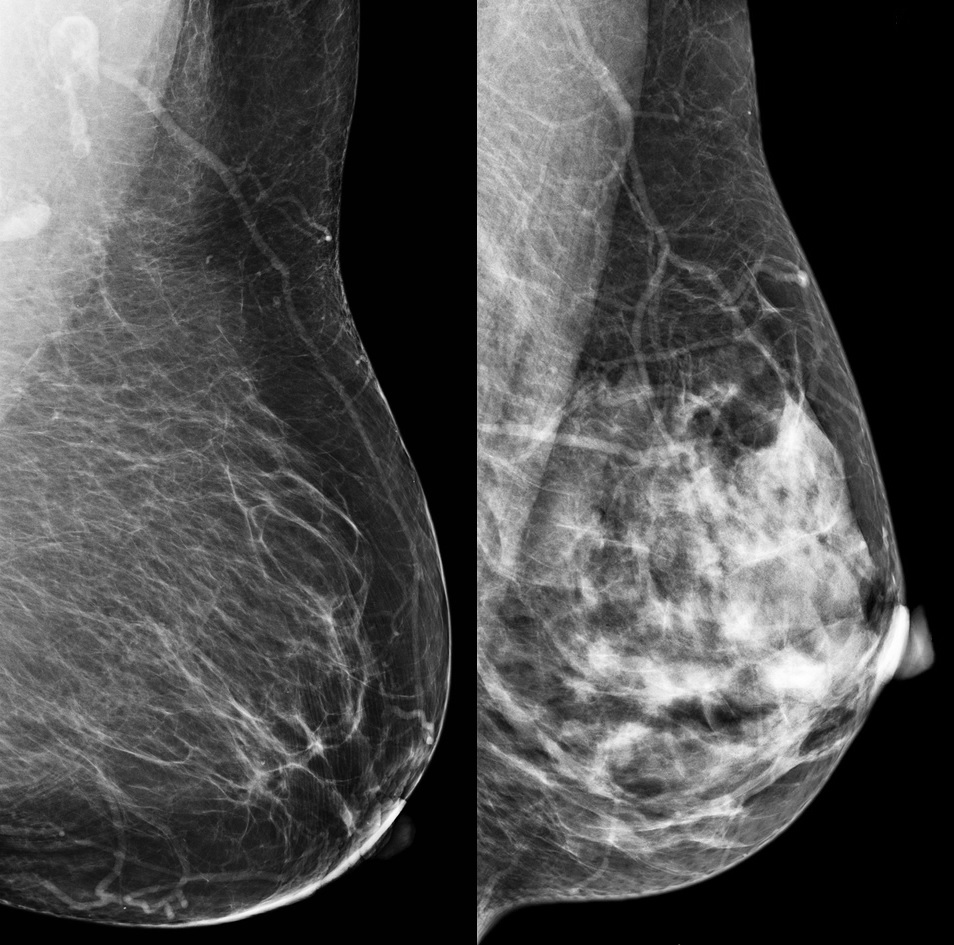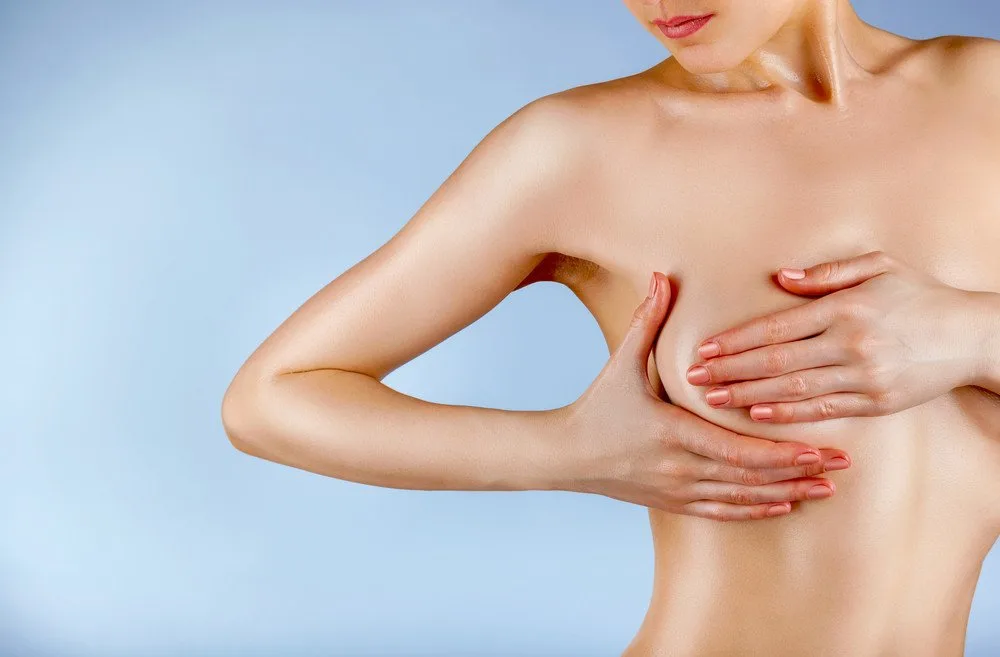October is Breast Cancer Awareness Month, and we need to remain vigilant. According to renowned specialist surgeon and breast disease specialist, Professor Carol-Ann Benn, those with higher-density breast tissue face a greater risk of breast cancer, although no one is immune to the risk of developing the disease. Alarmingly, almost two-thirds of women who are diagnosed with breast cancer have no significant risk factors.
Both men and women are urged to check and screen regularly
“The most important point to remember is that breast cancer is neither ageist, racist nor sexist: breast cancer can happen to anyone,” says Professor Benn. Together with Netcare, she founded the internationally accredited Netcare Milpark Breast Care Centre of Excellence in Johannesburg, South Africa.
How do you know if you have dense breast tissue?
Dense breast tissue is identified through a mammogram, where more than three-quarters, or 75%, of the breast is composed of fibro glandular connective tissues and glands such as the milk ducts. This is considered an independent risk factor for breast cancer. There is an additional concern due to the increased difficulty in detecting small lesions in dense breast tissue.
Higher-density breast tissue should be monitored
The risk this represents is significant. It is some four to five times higher than for similarly aged women with less dense breast tissue. “If your breast tissue is dense, additional breast cancer surveillance is therefore recommended, preferably with either breast MRIs or six-monthly ultrasounds,” Benn adds.
What Is Breast Tissue Density?
According to the Centers for Disease Control in the US, breast density reflects the amount of fibrous and glandular tissue in a woman’s breasts compared with the amount of fatty tissue in the breasts, as seen on a mammogram.
The 4 categories of breast tissue density
On a mammography report, breast density is assigned to one of the following four categories—
- The breasts are almost entirely fatty (about 10% of women).
- A few areas of dense tissue are scattered through the breasts (about 40% of women).
- The breasts are evenly dense throughout (about 40% of women).
- The breasts are extremely dense (about 10% of women).
Women in the first two categories are said to have low-density, non-dense, or fatty breasts. Women in the second two categories are said to have high-density or dense breasts. About half of women who are 40 years old or older have dense breasts.
Why Is Breast Tissue Density Important?

The image (from the CDC website) on the left shows a mostly fatty breast, and the image on the right shows a dense breast.
Breast Cancer Risk
Women with dense breasts have a higher chance of getting breast cancer. The denser your breasts are the higher your risk. Scientists don’t know for sure why this is true. Breast cancer patients who have dense breasts are not more likely to die from breast cancer than patients with non-dense (fatty) breasts.
Mammograms
Dense tissue can hide cancers. Fibrous and glandular tissue looks white on a mammogram. So does a possible tumor. Because it’s hard to tell the difference between a tumor and dense breast tissue on a mammogram, a small tumor may be missed.
Who Is More Likely to Have Dense Breasts?
According to the CDC, the density of your breasts can change over time. Generally, you’re more likely to have dense breasts if you—
- Are younger.
- Being pregnant or breastfeeding
- Are taking hormone replacement therapy.
- Have a lower body weight.
Risk factors
Professor Benn explains further that various risk models aim to develop personalized screening programs to help categorize patients based on their risk. This should, at least in theory, allow for higher risk women to be identified for closer monitoring and more imaging tests.”
“While there have been many tools developed in an attempt to quantify risk, none are regarded as being 100% accurate. It’s therefore important that both women and men regularly go for radiology screening.”
Know your risk
She points out that not all risk factors are modifiable. This means while there are certain risks we may have some control over, such as exercising or not smoking, there are other risks such as genetic factors we are unable to change.
Preventative benefits of aerobic exercise
It should be emphasized that there is no sure way to prevent breast cancer! “There are many factors involved that are beyond our control. However, regular aerobic exercise and maintaining your body mass index (BMI) under 25 are recommended, as obesity is associated with increased breast cancer risk.”
Exercise reduces risk
Benn adds; “It has been estimated that exercise decreases the risk of developing breast cancer by approximately 42%. Exercise post-diagnosis and treatment have also been shown to decrease the risk of recurrence. Studies seem to suggest that aerobic exercise of moderate intensity for about 45 minutes per day could be most beneficial.”
What Should I Do If I Have Dense Tissue Breasts?
According to the CDC, you should talk to your doctor about your personal risk of getting breast cancer. Dense breasts are just one of several risk factors for breast cancer. Your doctor will also think about other factors, like your age and family history of cancer.
Tests to consider
Different tests may be able to find some cancers that are missed on a mammogram. But these tests are more likely to have a false positive result (the test is reported as abnormal, but you really don’t have cancer). False positive test results often lead to unnecessary tests, like a biopsy. Also, you may have to pay for these tests.
Your doctor may suggest one of these tests—
- Breast ultrasound. A machine that uses sound waves to make detailed pictures, called sonograms, of areas inside the breast.
- Magnetic resonance imaging (MRI). A kind of body scan that uses a magnet linked to a computer. The MRI scan gives detailed pictures of areas inside the breast.
Talk with your doctor about how frequently you should be screened for breast cancer and which tests your doctor recommends.
Do regular checks
Professor Benn reiterates the importance of a healthy, balanced diet as well as exercise.
“These are both important ways of reducing some of our modifiable cancer risks, however checking your breasts regularly remains absolutely vital, as early detection promotes better outcomes should cancer be diagnosed.”
Alcohol increases risk
The products released when alcohol breaks down in our bodies are toxic to cells. Alcohol is also broken down to ‘bad estrogens.’ This promotes an overall increase in estrogen, which is typically associated with breast cancer.
Why?
Alcohol should also be considered as ‘empty calories. It has a high-calorie content without contributing significant nutritional value. Weight gain that may result from this is most commonly abdominal obesity. This is linked to a higher risk of cancer. Abdominal fat can also be considered carcinogenic in the sense that it stimulates the production of hormones associated with increased cancer risks.
“There have been some interesting recent studies suggesting that people who drink alcohol may be able to counteract its damaging effects through moderate to significant exercise,” she adds.
Bottom line
No one can afford to be complacent about breast cancer. Regular screening and self-examination are essential to monitoring your breast health. If you have higher-density breast tissue, you need to actively monitor your status. Whoever you are, you could develop breast cancer.
Benn concludes
“We are unfortunately seeing a notable increase in younger women developing breast cancer. It is therefore important that awareness of the benefits of self-examination and screening from a young age is reinforced.”
About Professor Carol Ann Benn

Professor Carol Ann Benn is a renowned specialist surgeon and disease specialist. She was established with Netcare the Centre of Excellence at Netcare Milpark Hospital. The centre was granted a three-year, full accreditation by the National Accreditation Program for Breast Centers (NAPBC), administered by the American College of Surgeons. The centre received 100% compliance to 29 standards. It is one of only three breast care centres outside the USA that have been accredited by the NAPBC. This is a remarkable feat for South African healthcare, given that there are at present only three breast care centres.
The Netcare Milpark Breast Care Centre of Excellence works in conjunction with the Helen Joseph Hospital (HJH) breast centre to ensure that equivalent breast care is available irrespective of access to medical funding.
References:
Netcare Hospitals: Women, mother and baby services: https://www.netcarehospitals.co.za/Specialised-services/Women-mother-and-baby-services/Breast-care
The Center For Disease Control US: https://www.cdc.gov/cancer/breast/basic_info/dense-breasts.htm
Read more
What You Need To Know About Mammograms, And Why They’re Important





![women [longevity live]](https://longevitylive.com/wp-content/uploads/2020/01/photo-of-women-walking-down-the-street-1116984-100x100.jpg)










